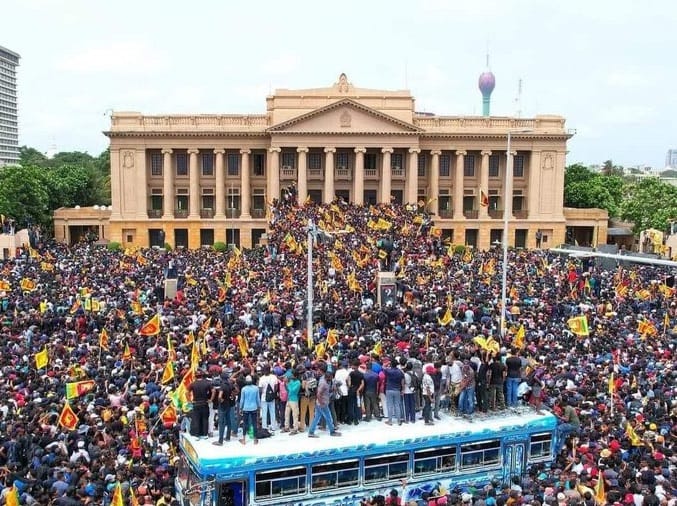Last Updated on July 13, 2022 9:07 pm by INDIAN AWAAZ

AMN / WEB DESK
Despite Emergency being declared, Sri Lanka protesters have stormed and taken over Prime Minister office, deployed army stands down.
Sri Lanka has declared a state of emergency as thousands mob the prime minister’s office after the country’s president fled to the Maldives, following months of widespread protests over the economic crisis.
Ranil Wickremesinghe instructed the military and police, to do what is necessary to restore order, he said in a televised statement today after protesters attacked his office. He added that the demonstrators want to stop him from discharging his responsibilities as acting president, but he can’t allow fascists to take over.
Sri Lankan President Gotabaya Rajapaksa, who fled to the Maldives today, telephoned the speaker of parliament saying that his resignation letter will be sent later in the day.
Speaker Mahinda Yapa Abeywardena said in a video statement that, the president got in touch with him over the phone and said that he will ensure that his resignation letter will be received by me today. Speaker appealed to the public to have confidence in the parliamentary process they have outlined to appoint a new president on the 20th of this month and be peaceful.
Meanwhile, Protestors have breached the gates to the prime minister’s office and are flooding the grounds, According to media reports. BBC reports that the grounds are now completely overrun with joyous protesters, with crowds climbing on anything and everything they are able to get their hands on. Many are standing on balconies screaming with jubilation, after an hours-long standoff with armed police officers outside the gates of the compound.
On other hand, the Sri Lanka Rupavahini Corporation (SLRC) and Independent Television Network (ITN) have suspended their live and recorded telecasts as the corporation premises is being surrounded by protesters.
Officials say engineers shut the channel down as throngs of protesters entered the state television office. The economic crisis in the island-state of Sri Lanka that started in 2019, is the country’s worst-ever since its independence in 1948. The crisis saw unprecedented levels of inflation, near-depletion of foreign exchange reserves, shortages of medical supplies, and an increase in prices of basic commodities.
The crisis is said to have begun due to multiple compounding factors like external debt, a nationwide policy to shift to organic or biological farming, tax cuts, Easter bombings in 2019, and the impact of the COVID-19 pandemic. India has been helping Sri Lanka through humanitarian assistance worth over 3.5 billion dollars by providing food, medicines, and fuel through several lines of credit.
